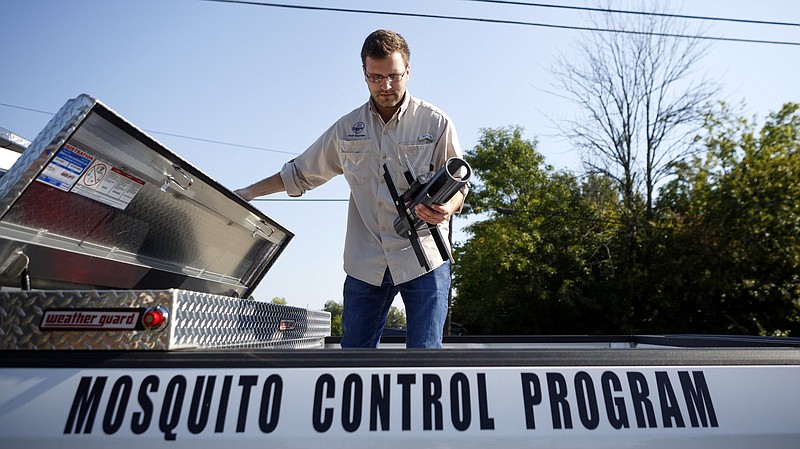The trap sat waiting beside an abandoned house on Wilder Road for Drake Kovacs to return and collect his spoils.
By the time the next morning's traffic cleared, Kovacs was back on the familiar route down Amnicola Highway. He turned the white Ford F-150 right at the tire shop and parked in front of the old house, where a month ago his catch was flagged for a dangerous disease.
The location has everything Kovacs looks for: nearby stagnant water, overgrown brush and tall weeds. It's the kind of place where in warm seasons his target thrives. Old tires that harbor pockets of water are prime breeding grounds. It's also off the beaten path, so a passerby is less likely to disturb the trap.
He caught a waft of the pungent mixture - fermented hay, water and yeast - used to lure his catch as he lifted the net full of mosquitoes. It looked like a successful haul. Because while most people go out of their way to avoid mosquitoes, Kovacs seeks them out.
Mosquitoes are more than a nuisance. They carry potentially deadly diseases such as West Nile virus, which can affect humans and horses who are bitten by an infected mosquito.
There is no treatment or human vaccine for West Nile virus, and most healthy people don't notice when they're infected. However, some people will develop a fever and other symptoms, including headache, body aches, joint pains, vomiting, diarrhea or rash. In rare cases, West Nile virus infection causes severe illness and can lead to death. The virus killed 167 people in the United States in 2018.
From 2012-2017, seven cases of West Nile virus were reported to the Chattanooga-Hamilton County Health Department. It's also the most common and concerning mosquito-borne disease found in Hamilton County, which is why Kovacs' job as an environmental health technician at the health department is to trap the insects and send them to a state lab for testing.
Kovacs uses what's called a gravid mosquito trap designed to attract and capture female mosquitoes ready to lay their eggs. The fermented mixture's smell draws them to the trap, where a fan sucks them into a net. There, they wait for Kovacs to return the next day and freeze them to death using dry ice.
He needs to preserve their fragile bodies in order to look at them under a microscope and spot Culex mosquitoes - the yellowish brown ones with plain legs, no stripes. Culex is the species that carries West Nile virus.
Using tweezers, Kovacs hand-selects each Culex, places up to 50 into a vial, labels it with the address where the batch was trapped and ships the mosquitoes off to be analyzed for diseases.
He repeats the process every Monday to Thursday from April 1 through Sept. 30 as part of the health department's mosquito surveillance program.
The Chattanooga-Hamilton County Health Department launched its program last year as part of a statewide monitoring initiative. Grant money from the Tennessee Department of Health paid for two trucks and eight traps, and the county foots the bill for personnel.
Last year, Kovacs and a colleague were also collecting aedes aegypti mosquitoes, which can carry the Zika virus. Zika virus is currently not established in the region but became a major concern in 2015 and 2016 when outbreaks in the Americas were linked to serious birth defects. Local transmission was limited to a few cases in Florida and Texas, and no recent cases have been reported in the United States. However, the virus remains a concern for travelers, particularly pregnant women.
This year, it's all about the Culex and monitoring for West Nile, which the health department also found last year in Hamilton County.
"West Nile virus is the virus we see most around here, so that's the one we worry about the most," said Bonnie Deakins, director of environmental health sciences at the health department.
It took Kovacs almost four months of setting traps throughout the county, but he got his first sign the virus was back in July. State lab results revealed that mosquitoes trapped near the abandoned house tested positive for Flanders virus. The virus doesn't affect humans but serves as an indicator that West Nile virus isn't far.
"They told us to retrap it, because apparently if you find Flanders then normally you'll find West Nile a couple weeks later," Kovacs said. "That's exactly what happened."
West Nile also turned up in a trap around Amnicola Highway last year.
"It keeps appearing there for some reason," he said.
The most effective prevention against West Nile virus or any mosquito-borne disease starts "from the body outward," Deakins said.
Starting at the skin, use EPA-approved insect repellents, wear long sleeves and pants, use screens on windows and doors, and eliminate or reduce standing water - where mosquitoes breed - whenever possible.
"The Culex is what they call a container breeder. It likes small containers of water, like plant pots without plants, kids' toys, or even your gutters can get stopped up and hold water," she said. "If it's like a bird bath, you want to empty it out once a week and scrub it then refill it. Don't let the water stay there long enough for the mosquitoes to go through their whole life cycle."
In the meantime, Kovacs will keep hunting and trapping mosquitoes until their season dwindles in October. Most years, the majority of human West Nile cases in the Southeast occur in August and September, according to public health officials.
People who think they may be infected should visit a health care provider. More information about West Nile virus is available on the department of health's website or by calling the health department's Environmental Health Services division at 423-209-8110.
Contact staff writer Elizabeth Fite at efite@timesfreepress.com or 423-757-6673.
More Info
Tips from Tennessee and Georgia health officials:- Mosquitoes carrying West Nile virus usually bite at dusk and dawn, so avoid or limit outdoor activity at these times.- Use insect repellents such as DEET, Picaridin, oil of lemon eucalyptus or IR3535 on your skin, following all label recommendations for use. Pay particular attention to recommendations for use on children, and never apply any of these products around the mouth or eyes at any age. Consult your health care provider if you have questions.- Reduce mosquito populations around your home. Mosquitoes can breed in any place that holds standing water, including clogged drains or gutters, watering cans and empty bottles.- Use products containing permethrin, a highly effective insecticide, for clothing, shoes, bed nets and camping gear. Permethrin-treated clothing repels and kills ticks, mosquitoes and other pests and retains this effect after repeated laundering. Some commercial products are available pretreated with permethrin. As a caution, however, it is not to be used directly on skin.- Wear “long, loose and light” clothing, like long-sleeved shirts and long pants, to help prevent bites through fabric. Tuck your pants into your socks and your shirt into your pants. Light-colored clothes are less attractive to many insects and may allow you to spot them more easily.- Make sure doors and windows are in good repair and fit tightly, and fix torn or damaged screens to keep mosquitoes out of the house.- Anyone with questions about mosquito-borne viruses should speak to their health care provider or call their local county health department or environmental health office.

